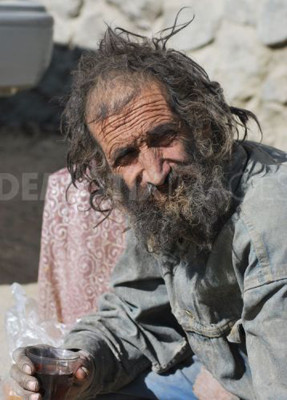The Killid Group, August 20, 2013
Police and law fail to stop drug traffickers
Police are alleged to facilitate the sale of narcotics
By NematullahTanin
As compared to previous years arrests of drug traffickers has fallen this year and drug addiction levels show no sign of slowing down. An investigation by NematullahTanin.
"You can obtain any type of narcotics at any time of day or night," says a drug seller in Kabul's Silo Park who wants to be anonymous.
Asked if the police know his whereabouts, he laughs. "Where is the police? They are also sons of this country. The KoochaAndarabi of DehAfghanan of Kabul is another place where you can find as much narcotics as you wish. It is sold openly. The police once or twice a week collect their share as per an agreement, and leave without disturbing the business."
Addicts confirm the easy availability of narcotics. Hamid who consumes a small packet of heroin told Killid: "You can get drugs round the clock. drugs and sellers are in abundance."Hamidspends between 25 and 100 Afs(one dollar is 56 Afs) every day.
Police are alleged to facilitate the sale of narcotics, but Deputy Police Commander of KabulDaudAmin strongly denies the charge. "Since I have been assigned this job I have never faced such a claim that the police are in agreement with the sellers. There is no evidence," he insists.

In Afghanistan more then one million drug addicts hope to get assistance with their problems. (Photo: Demotix)
Ahmad Khalid Mowahed, spokesman and chief of Counter Narcotics Justice and Judiciary Press Office,did not want to challenge Amin. He said, "In 2012 the head of 9th Police District and some other authorities who were involved in business of narcotics were arrested by us and theyare still in jail."
Known dealers
Abdul RufUruzgani, head of 1st Police District,while not directly commenting on the allegations of police involvements says everyone who joins the police is not a professional. "They might be people who are driven by personal interest rather than common interest," he adds.
He says the drug mafia use children as decoys to evade law enforcers. Also addicts are recruited as drug peddlers.
Kabul Deputy Police CommanderAminsays police in most districts are familiar with those in the drug business.
Mushtaq Ahmad, head of 5th Police District,rejected any involvement of his police force in the supply and distribution of drugs. "Since the start of the year officers of this district have arrested 16 sellers and handed over the cases to Justice and Judicial departments," he says.
He charges "staff of the Ministry of Public Health (MoPH)" of being involved in narcotics selling in Silo Park. "Whenever we have tried to arrest them they show us permits of the ministry," he says.
Officials deny their staff is deputed to distribute drugs to addicts in the community. "The MoPH prescribes a specific quantity of opium for addicts (part of a de-addiction programme) but they have to come to curing centres for their doses," says Dr ShapoorYousuf, deputy head of drug demand reduction office in the ministry.
Mild sentences
Punishment for drug trafficking, which is a serious offence, can range between a few years and 20-30 years imprisonment depending on the amount of narcotics seized from traffickers.
But SayedMahdiKazemi, spokesman to the deputy ministry of Counter Narcotics of Ministry of Interior Affairs (MoI),blames the increase in drug addicts to short sentences handed down to offenders. "The officers in charge of anti-narcotics operations arrested 120 street sellers peddling drugs but they were all released after a short term in prison and went back to selling narcotics," he says.
The number of arrests was higher in the first quarter of 2012.
Mowahed, spokesman and chief of Counter Narcotics Justice and Judiciary Press Office, says in the first quarter of this yeardossiers on 111 narcotics smugglers were finalised by the public security department of the Supreme Court, while roughly 41,975 kg of narcotics were detected and confiscated.
Public perceptionabout who is responsible for the menace of drug addiction continues to point at the police. The Deputy Ministry of Counter Narcotics of MoIblames staff shortage for the government's inability to check drug trafficking.
AyubShahriar, head of Kabul Youths Cultural Organisation,asserts the police dealing with anti-drug enforcement "know well the location and individuals involved … but they don't take action for different reasons."
Kazemi,spokesman to the Deputy Ministry of Counter Narcotics,calculates there are probably 3 million people involved in the drug trade in Afghanistan. At current staffing levels there is one policeman for 1,200 drug peddlers "which is too little but still the police do their job honestly," he says.
From time to time drug addicts are herded together in every district for specialised care. Six months ago addicts and sellers in the 13th District were taken away "so the people live in peace", says M. YousufHashemi, head of 13thPolice District.
Narcotics from Afghanistan feed an international market controlled by the underworld. ZabihullahDayem, the advisor to the Ministry of Counter Narcotics says people are paid to cultivate opium and fight against the security forces.
Minister of Interior Affairs MujtabaPatangwho was dismissed by Parliament last month has accused some lawmakers of smuggling drugs from Afghanistan to Nigeria.
Characters Count: 6349
